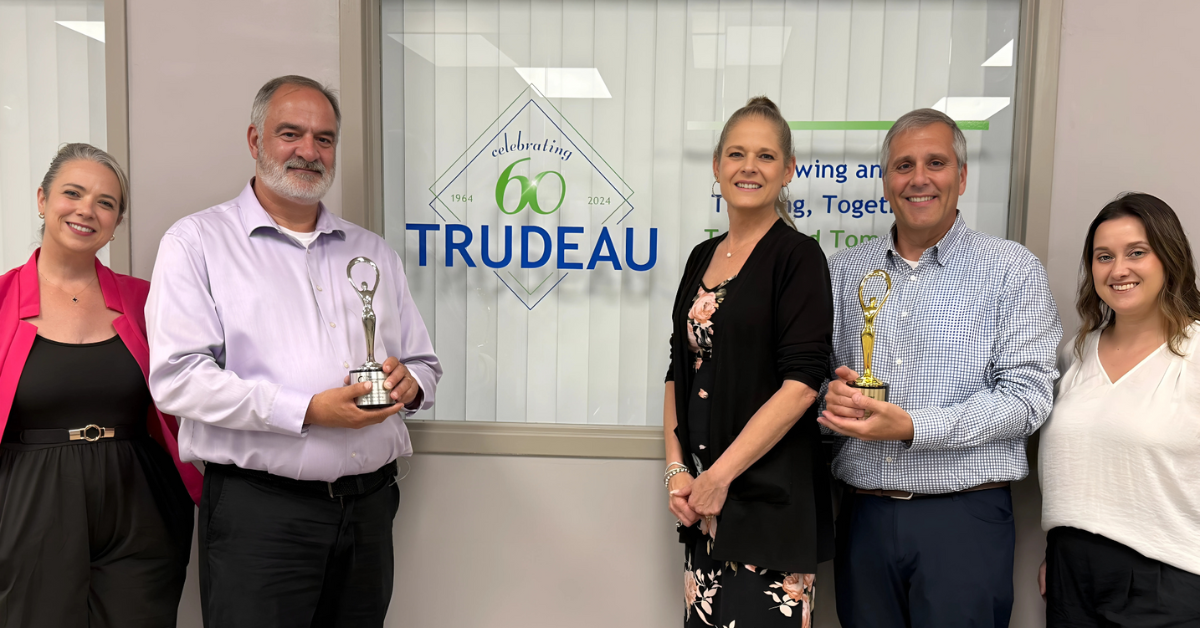Trudeau Center, Dunn Marketing Win 2025 Communicator Awards for Empathy-Driven Awareness Campaigns
The J. Arthur Trudeau Center and its ad agency of record, Dunn Marketing, have been honored with two 2025 Communicator Awards by The Academy of Interactive & Visual Arts for awareness-building campaigns focused on the Center’s sixty years of serving and empowering individuals of all ages with intellectual and developmental disabilities.
The Trudeau Center and Dunn Marketing received an Award of Excellence for a video, “Transforming Lives at Trudeau for 60 Years,” which chronicles six decades of the Trudeau Center’s transformative impact on those it serves and their families. The pair also received an Award of Distinction in the Out-of-Home and Environmental category for its series of billboards that reinforced the organization’s forward-looking mission with the powerful message, “We Create Bright Futures” and highlighted Trudeau’s services, programs, and career opportunities at several key locations throughout Rhode Island.
“The work we did with Dunn Marketing to raise awareness of the Trudeau Center’s services and impact during our sixtieth anniversary year was truly a labor of love,” said Dr. Al J. Vario, President and Chief Executive Officer of the Trudeau Center. “We at Trudeau are very proud of our long history of serving those with intellectual and developmental disabilities, and we’re excited as we look ahead to what the future of our agency will bring for those we serve in Rhode Island and beyond. The team at Dunn Marketing did a beautiful job of capturing who we are as an organization and why our mission is so important, and so I think these awards are well-deserved.”
The recognition comes as part of a banner year for the Northeast Connecticut based marketing agency, which also received a third Communicator Award for its financial services marketing work with client WHZ Strategic Wealth Advisors.
“We’re absolutely thrilled to receive this recognition from the Academy of Interactive & Visual Arts for our work with an organization that truly embodies our core belief that empathy drives meaningful connections,” said Marci Seney, Vice President of Client Services at Dunn Marketing. “The Trudeau Center’s mission of empowering individuals with intellectual and developmental disabilities aligns perfectly with our approach of understanding and serving people as complete human beings. These awards validate the power of authentic storytelling in the nonprofit sector.”
Since 1964, the Trudeau Center has served as a leading provider of services for individuals with intellectual and developmental disabilities in Rhode Island and is one of the few human service organizations serving individuals at all life stages. More than 1,000 people annually from Rhode Island, Connecticut, and Massachusetts are served by the Center’s comprehensive programs, which include early intervention, education, adult day programs, employment support, and residential services.
Dunn Marketing’s mission is to fuel the success of good people doing great work through comprehensive marketing and communication services developed according to the agency’s own “Empathy-Driven Brand Building™” process. The agency serves organizations in life services industries including the nonprofit, healthcare, finance, and legal sectors, as well as small-to-medium businesses.
The Communicator Awards is sanctioned and judged by The Academy of Interactive & Visual Arts, an invitation-only organization consisting of top-tier professionals from acclaimed media, advertising, and marketing firms. The Academy’s mission is to advance the arts and sciences of traditional and interactive media through educational, cultural, and professional programs.









